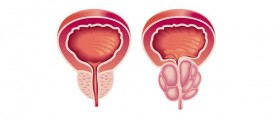
Prostatectomy is a surgical removal of the prostate, a male gland in charge of production of a slightly alkaline, milky/white fluid that accounts for 20-30% of the volume of the semen. The gland also participates in ejaculation with its smooth muscles. Men suffering from certain illnesses affecting the prostate gland may experience erectile dysfunction. Also, those who have undergone prostatectomy are often faced with this rather unpleasant and embarrassing health issue. Still, even if erectile dysfunction develops, an affected individual should not be worried because there are effective treatments that can restore men's ability to achieve and sustain erection sufficient enough to have sexual intercourse.
Erectile Dysfunction and Prostatectomy
Erectile dysfunction is one of several expected side effects after prostatectomy. The surgery is predominantly performed in men suffering from operable, localized prostate cancer. Today thanks to the advent of the nerve-sparing radical prostatectomy this complication may be successfully prevented although it affects certain number of operated patients.
The very tumor is blamed for many psychological changes in a man's life. However, once it is removed and in case erectile dysfunction occurs, the man will feel much worse. Preserving the ability to perform well in bed is especially important for young men.
Unfortunately, even after the very best surgery many patients may have problems with their erection. The recovery of the penile function is closely connected with recovery of all the tissues that have been affected by the surgery. It may take months for erection to be achieved again. There are many explanations why the recovery may be delayed. For instance, nerves in the area may be overstretched during the procedure or they are directly damaged by electrocoagulative cautery while the gland is being dissected. Bleeding as well as inflammation are two contributing factors to delayed recovery.
Preoperative potency status is one of the major determinants whether the erection will be achieved again and whether it will be the same as the one before the surgery. It is normal for men to experience a decline in erectile function as they get older. So, erection is age related and it also may be affected by other medical conditions a man is suffering from. It is known that men suffering from diabetes, those with cardiovascular diseases as well as patients that take certain drugs may have erection problems. Now, if this was the case prior to the surgery, it is highly likely that erectile dysfunction will occur after surgery and the condition might not be brought under control.
All in all, patients that have undergone prostatectomy and now are experiencing erectile dysfunction can benefit a lot from medications such as Viagra, Cialis and Levitra. They may also use intraurethral suppositories or receive intracavernous injections. Additional help is obtained from vacuum constriction device and penile implants.
Cancer Caused Erectile Dysfunction
The prostate cancer per se is many times the reason why men cannot achieve and sustain erection. However, as it has already been mentioned the problem may result from prostatectomy as well other treatment options these patients are recommended.
Although medical experts have developed several surgical approaches that try to preserve one's erection, there is still much debate without consensus about the advantages and disadvantages of surgery and other treatment modalities used in case of prostate cancer patients. For example, it seems that radiation therapy, cryotherapy and hormonal therapy may be less responsible for erectile dysfunction. After surgery erectile dysfunction occurs immediately while after radiation therapy there is a steady decline in erectile dysfunction which is so much better. Namely, the problem usually starts 6 months after radiation therapy and is gradual. This is the most commonly reported side effects of such treatment. The risk of erectile dysfunction is lower in patients treated by brachytherapy or sophisticated forms of radiation therapy such as IMRT or 3-D conformal radiotherapy.
Even hormone therapy for prostate cancer may easily precipitate erectile dysfunction. The problem generally develops 2-4 weeks after the onset of the treatment. Such patients may additionally experience a decreased libido.
As it has already been mentioned therapy for erectile dysfunction can be medicamentous or include certain devices such as a vacuum constriction device and penile implants. Drugs are either taken orally, inserted into the urethra or injected directly into the penis. Vacuum constriction devices may be uncomfortable and provide with less desirable results in previously operated patients. Penile implants might be the best solution, especially if all else fails. The one may undergo this treatment only a year after cancer treatment. The success of this treatment approach is up to 95% and both partners are quite satisfied with the results.
Finally, there are relatively new strategies called cavernous nerve interposition grafting and neuromodulatory therapy both of which might repair damage caused by prostatectomy. They promote revitalization of intact nerves and nerve growths which in the long run might improve erection significantly.
To sum up, erectile dysfunction may arise from the very tumor of the prostate gland or practically all available treatments. However, thanks to modern medicine, even if this medical issue develops, it can be efficiently brought under control and cause no additional psychological problems.









_f_280x120.jpg)






Your thoughts on this
Loading...